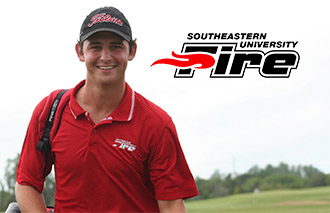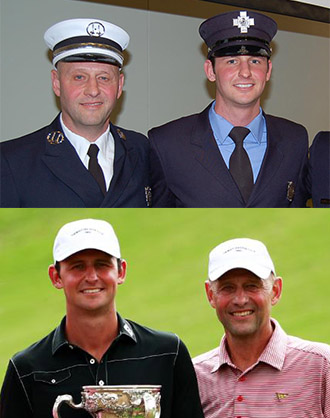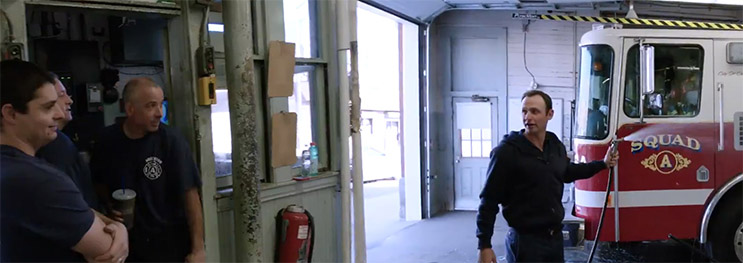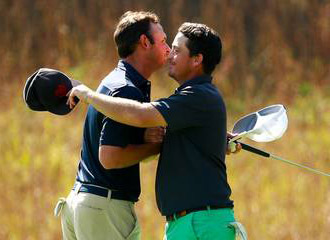
The two lives of Matt Parziale: on Ladder 1 of the Brockton Fire Department, and on
the golf course as a USGA champion (John Tlumacki/Boston Globe and USGA photos)
"Tiger Woods is the reason I play golf."
So says the 30-year-old firefighter from Brockton, Massachusetts who was 9 years old when he watched Woods destroy the field at the 1997 Masters. One month from now,
Matt Parziale will get the chance to compete against his idol, when they both tee it up in the Masters.
The
Masters invitation is just one of the rewards for
winning the U.S. Mid-Amateur Championship at the Capital City Club in Atlanta last October. In the final, Parziale's performance was Tiger-like, shooting the equivalent of a 63 in the morning round and never giving his opponent much hope in an 8&6 win.
Parziale has been following Woods' comeback closely, and is no doubt hopeful about the prospects of the four-time Masters champion getting into contention at Augusta National next month. For Parziale, what better ending could there be but to spend a little time in Butler Cabin, accepting Low Amateur accolades and having a front row seat to Sergio Garcia putting a fifth green jacket onto his boyhood hero?
Even if things don't work out quite so perfrectly, Parziale will get another chance to make his mark against the world's best this June at the U.S. Open at Shinnecock Hills Golf Club. He is the first player to take advantage of the U.S. Open exemption for Mid-Amateur champions, as
the USGA introduced it in an announcement to players on the eve of the tournament in Atlanta.
Parziale wasted no time preparing for his new opportunities. Within weeks of his victory at the Capital City Club, he had already played practice rounds at Augusta National and Shinnecock Hills.
He has transformed a normally quiet offseason into a busy slate of work, practice, competition and travel designed to give him the best chance to compete at the highest level this spring and summer.
While Parziale's golf prospects are on a meteoric rise, it didn't start out that way. His early passion for all things golf and Tiger Woods didn't immediately translate into great golf, as he couldn't consistently break 80 in high school, much less win tournaments.

|
His college team was known as "The Fire".
An omen? (Southeastern photo)
|
But that all changed when he went south for college and was able to play year-round golf for the first time. Parziale attended Southeastern University in Lakeland, FL where he helped the Fire win the National Christian College Athletic Association national championship (winning individually in 2007) while earning All-American honors three times along the way.
He had already made up his mind to turn professional when he won his biggest amateur tournament to that point, the 2009 New England Amateur at Portsmouth CC in New Hampshire, on the way to becoming the Massachusetts Golf Association's Player-of-the-Year.
But after three years of trying to make a living playing golf with only modest success, Parziale decided to go in another direction and follow in his father's footsteps. Vic Parziale was the captain at the Brockton Fire Department and had been a firefighter since before Matt was born. Now Matt was ready to start his own career as a firefighter, and he has been with the BFD ever since.
Since applying for amateur reinstatement, Parziale has three more Massachusetts Player-of-the-Year awards and has won the Massachusetts
Amateur,
Mid-Amateur, and
Four-Ball, along with the
Francis Ouimet Memorial. His latest win was just last month, with partner Herbie Aikens at the
International Four-Ball in Florida.
It says something about the haul of the rewards for the new USGA champion that the exemption into the 2018 U.S. Amateur at Pebble Beach is just the third best perk that Parziale has received for his win at the Capital City Club.
If he had a less understanding fiancé he might have missed out on that opportunity, since his wedding to Ali Hubbard was originally scheduled for week of the U.S. Amateur. But they have moved the date to earlier in the month, and they will now go to Pebble Beach as newlyweds.

|
Matt working for Vic, Vic working for Matt
(Brockton Fire Museum, USGA photos)
|
Vic's 32-year career as a firefighter came to an end with his retirement just a month after Matt won the Mid-Am in Atlanta. Now his most important job will be as a caddy, as the two look to make memories at the Masters, the U.S. Open and whatever comes next.
Part 1: Short Answer
Age when you started playing golf: Hitting balls, putting and chipping: 3-4. On the course: 8-9
Age when you competed in your first tournament: 12
Your early golf hero(es): Tiger ("and there's not even a close second")
# of tournaments played in the last calendar year: 25
Favorite course(s): Sand Hills Golf Club
Favorite tournament: The Coleman
Who will you try to get a practice round with at the Masters? Tiger!
If the Brockton Fire Department held a company golf tournament, who would finish second? My Dad
(Editor's note: Vic Parziale carries an 8 handicap at Thorny Lea Golf Club)
Part 2: Open Answer
Please give a brief description of your game for someone who has never seen you play:
It’s pretty well-rounded but something I never worry about is putting. Not that I putt well every day, but I always have confidence in the way I putt, and even when I hit it bad sometimes putting can keep me in a tournament or win a tournament. I’ve put in a lot of work and it’s something I can rely on pretty much every day.
How is this winter different than normal, how did you go about putting together your schedule in preparation for the Masters, and how is it going so far?
I usually shut it down after the U.S. Mid-Am and I usually don’t touch the clubs until after the snow melts up here. But after I won the Mid-Am, I signed up for a few extra events late in the fall. Went down to the Crane Cup, also did the
Gosling Invitational which is over in Bermuda. Then we hit the holidays and I probably didn’t play much for 3 or 4 weeks.
I was able to go to South America with the USGA for the South American Am and that was a great experience. I’ve never been to Argentina or South America so it was definitely a fun time with a great group of people: four mid-ams and some people from the USGA. That was a good way to start out after the new year.
Then I had a couple of weeks off and played the Jones Cup. After that, what I was trying to do was to get down (south) every 7 to 10 days and I was able to do that through February, playing a few events in Florida and spending time with some friends down in Jupiter.
Going forward, I have a few trips planned to Augusta for my last few visits, and I’m also going to play in the
Azalea and spend some time at
Secession with some friends from home. It’s been great, no complaints with the winter so far.
As a first-time Masters participant, how do you balance the desire to “soak it all in” with the focus and concentration it will take to compete well?
I don’t agree with the first part. Obviously I am a fan of the tournament. But I live to play competitive golf at the highest level possible. It’s what I’ve always enjoyed whether it was getting into junior tournaments that I could get in, or amateur tournaments, and now being able to play the Masters and the U.S. Open this year.
I’ve just been trying to prepare as I would for any other event, and not just for the Masters but for the tournaments before the Masters. That’s what I enjoy doing the most: playing competitive golf and the process to get ready to play competitive golf.
Don’t get me wrong, it’s going to be a great experience. It’s going to be great meeting all of the guys (pros), but it’s the same at mid-amateur events, where you meet new guys, so I don’t think it will be too different. But probably after, looking back on it, that’s when all that other stuff will probably set in.
Do you have a good firefighting story?
I was able to fight one fire with my Dad before he retired. I was probably on for about two years, and we hadn’t worked (a fire) together. They don’t put family members in the same group so if something bad happens it won’t affect the family twice. It was in the winter when we had a bunch of snow, I think it was 2015, the winter of 15, where we had 3 or 4 storms in a row, and I was working overtime in my Dad’s group, and I don’t even think he knew I was working that night.
And we had a fire come in just after midnight and the truck I was on, we were there first. So we pulled up just like we normally do, but the problem we had was that the hydrant we had was covered with snow so it took a them a little longer to find the hydrant and get us water, after we used the water on the truck. So by that time my Dad’s truck had arrived and he came in.
You can’t see anything in a fire, you might as well close your eyes. So I was at the front with all of the guys, and my Dad came in and I heard him call out and then I felt him grab me and he’s like “who’s this?” And I knew it was him and after that we just had a blast. Once we found the water it was great. I’m happy we were able to do that together before he retired.

Matt and co-workers at the Brockton Fire Station (USGA Screenshot)
I think you nailed it there. When you’re in a fire, initially there’s four trucks on the scene, so we have 15 to 20 people show up at the same time. Everyone has a different role, it doesn’t matter if you’re inside the building, or you go onto the roof, or stay at the hydrant outside, or you’re meeting the truck that’s going into the building. Nothing happens on a fire scene without everyone being on the same page. And the thing is, fires never go as planned and things always change. So having guys around you that are well-trained and thinking the same, even when things go wrong, it makes it fun to be able to work with guys like that, and it’s a blast.
So what does it say about you that you are so strongly attracted to such polar opposite pursuits? Has anything about being a firefighter helped you in your golf, or vice versa?
I don’t think they are related at all. I’ve played competitive golf for a big part of my life, and it’s been pretty separate. I don’t think being a firefighter helps me play golf, and I don’t think being a golfer helps me be a firefighter. I’m just lucky enough to do two things that I really enjoy. What I have with the fire department is great: I get to play a lot of competitive golf, and at the same time, it’s great to be able to work with a great group of guys that become some of your closest friends.
To win a USGA amateur event you have to win six straight matches, which takes great golf but it’s hard to play your best golf in six straight matches, so you also need some good fortune. At the U.S. Mid-Am last year, was there a point where you look back and say “wow, I really could have been knocked out of the tournament right there”?
Yes there was, but it wasn’t because I was playing poor golf. In my quarterfinal match, I was 5 down with 8 to go. And I wasn’t playing poorly. I was playing
Brad Tilley and he made 5 birdies in the first 10 holes. I wasn’t making the birdie putts, I wasn’t hitting it close enough but I was hitting good shots and hitting good putts so I wasn’t worried.

|
Parziale and Tilley after their 20-hole match
(USGA photo)
|
Usually when you’re 5 down, when you’re getting beat pretty good, you start thinking “Well I guess I got to get on the flight tonight, got to go to work tomorrow”, all this stuff. But that didn’t happen because I still felt confident even though I was so far down. And luckily I hit one close, I made a putt, hit another one close. And he made his first bogey of the day on the 15th hole and I was only one down. Even at that point you don’t think you’re going to win; I was pretty proud to make it a match and have a chance to win. Then I was able to birdie the 17th hole, making about a 25-30 foot putt, and was able to win in extra holes.
So that was the time that I was closest to going home but another time was in my round of 32. That match was pretty even the whole way, never more than 1 or 2 up, back and forth, and I hit some really bad shots down the last 3 holes, but I was able to get up and down on all three. They are probably the 3 best up-and-downs in a row that I’ve had in my life, and one came from 100 yards on the last hole. I made a 20 footer and he ended up missing a 15 footer for birdie to go to extra holes. So those things happen in match play. Anything can happen, things can change quickly, and I was lucky enough to be on the right side of all those matches that week.
At the Francis Ouimet Memorial last year, you shot a 66 to take a one-shot lead into the final round, then you reported for work at the fire department in the overnight shift, and came out the next morning and won the tournament by two shots. Most golfers are pretty routine-oriented; can you describe what your mental approach was that day and how you embraced a pretty chaotic situation?
I wasn’t able to sleep when I got home, so I just got right from work to the course. It’s something that you get used to. It’s not easy by any means, but that’s my life. I’m very fortunate to be able to play competitive golf. So when schedules conflict, if I’m able to make it work, I'll play even if it’s tight timing.
When you get into the final group with the lead, you’re thinking about winning the tournament, even though your body might be tired. You get into that situation and all you know takes over. I’ve been fortunate enough to be in those spots enough to feel comfortable with how to win a tournament. The first 9 holes that day weren’t very good. I think I was actually 2 or 3 back at one point, but I never worried. Down the stretch, the last 9 holes, anything can happen in any tournament. Usually my goal is just to have a chance with 9 to go, and if you’re lucky enough to hit the shots and have the putts fall, then you’re usually able to win.
How does it feel now that you are a USGA champion? Does it feel different when you arrive at a tournament, when you set your goals?
I don’t think it’s different. I don’t approach the game any differently since winning. I don’t know if I like the word “goals”. I mean if you’re not playing to win and that’s not your ultimate goal, then there’s no reason to make goals really. If you’re not trying to do the best at all times then I don’t know what your other goals would be. Going into tournaments now, the only thing that's changed is that I’m able to play the Masters and the U.S. Open, the U.S. Am 2 years and I’m exempt for the U.S. Mid-Am for 10 years. And that’s what I love most, playing competitive golf at the highest level. So I wouldn’t say the attitude changes, the approach to the tournament changes, it’s more that I’m just fortunate enough to be in those events and compete at a very high level.
What is the best piece of advice you have been given about your upcoming opportunities and who gave it to you?
That’s a great question because I’ve reached out to all my friends who have won the U.S. Mid-Am, like
Scott Harvey,
Austin Eaton,
Stewart Hagestad,
Kevin Marsh, all these guys that have had success,
Nathan Smith. And they’ve been great, just telling me how (Masters) week is going to go. There are a couple of friends on tour that I have I’ve talked to. Everyone says it’s the best event you’ll ever play. I was able to spend a week with Scott in South America and we talked a lot about it, and he was great. They can’t really tell you how to play the course because it’s always different. It was more about everything around the week, other than the actual playing of the event, of what to expect.
Editor's note: The USGA put together an excellent short video about Matt and his life in Brockton, which you can see below.
USGA Golf Journal
"Matt Parziale: Hometown Hero"